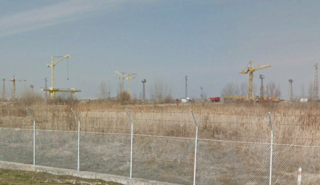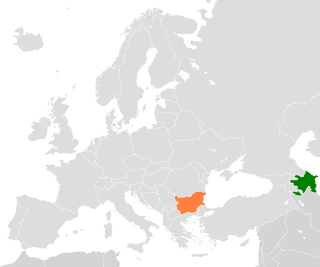Related Research Articles

The economy of Bulgaria functions on the principles of the free market, having a large private sector and a smaller public one. Bulgaria is an industrialised upper-middle-income country according to the World Bank, and is a member of the European Union (EU), World Trade Organization (WTO), Organization for Security and Co-operation in Europe (OSCE) and Organization of the Black Sea Economic Cooperation (BSEC). The Bulgarian economy has experienced significant growth (416%) starting from $13.15 billion and reaching estimated gross domestic product (GDP) of $67.9 billion or $171.185 billion, GDP per capita of $24,595, average gross monthly salary of 1,500 leva, and net average monthly salary of $1,644 (2021). The national currency is the lev, pegged to the euro at a rate of 1.95583 leva for 1 euro. The lev is the strongest and most stable currency in Eastern Europe.

Organic farming is an agricultural system which originated early in the 20th century in reaction to rapidly changing farming practices. Certified organic agriculture accounts for 70 million hectares globally, with over half of that total in Australia. Organic farming continues to be developed by various organizations today. It is defined by the use of fertilizers of organic origin such as compost manure, green manure, and bone meal and places emphasis on techniques such as crop rotation and companion planting. Biological pest control, mixed cropping and the fostering of insect predators are encouraged. Organic standards are designed to allow the use of naturally-occurring substances while prohibiting or strictly limiting synthetic substances. For instance, naturally-occurring pesticides such as pyrethrin and rotenone are permitted, while synthetic fertilizers and pesticides are generally prohibited. Synthetic substances that are allowed include, for example, copper sulfate, elemental sulfur and Ivermectin. Genetically modified organisms, nanomaterials, human sewage sludge, plant growth regulators, hormones, and antibiotic use in livestock husbandry are prohibited. Organic farming advocates claim advantages in sustainability, openness, self-sufficiency, autonomy and independence, health, food security, and food safety.

Patrick Albert Moore is a Canadian industry consultant, former activist, and past president of Greenpeace. Since leaving Greenpeace in 1986, Moore has criticized the environmental movement for what he sees as scare tactics and disinformation, saying that the environmental movement "abandoned science and logic in favor of emotion and sensationalism". According to Greenpeace, Moore is "a paid spokesman for the nuclear industry, the logging industry, and genetic engineering industry" who "exploits long-gone ties with Greenpeace to sell himself as a speaker and pro-corporate spokesperson".

The Goldman Environmental Prize is a prize awarded annually to grassroots environmental activists, one from each of the world's six geographic regions: Africa, Asia, Europe, Islands and Island Nations, North America, and South and Central America. The award is given by the Goldman Environmental Foundation headquartered in San Francisco, California. It is also called the Green Nobel.

Balchik is a Black Sea coastal town and seaside resort in the Southern Dobruja area of northeastern Bulgaria. It is in Dobrich Province, 35 km southeast of Dobrich and 42 km northeast of Varna. It sprawls scenically along hilly terraces descending from the Dobruja plateau to the sea, and is often called "The White City" because of its white hills.

The Kozloduy Nuclear Power Plant is a nuclear power plant in Bulgaria situated 180 kilometres (110 mi) north of Sofia and 5 kilometres (3.1 mi) east of Kozloduy, a town on the Danube river, near the border with Romania. It is the country's only nuclear power plant and the largest in the region. The construction of the first reactor began on 6 April 1970.
The United Nations Environment Programme (UNEP) established the Global 500 Roll of Honour in 1987 to recognize the environmental achievements of individuals and organizations around the world.
Alexenia Dimitrova is a Bulgarian journalist and author who started her career in the late 1980s. She works for 24 chasa, the second largest Bulgarian daily. Her favorite topics are secret archives of the Cold War era, shadow affairs and corruption, money laundering, suspicious ownership and property, and secret societies. She profiled finding and reuniting lost people all over the world. For her series of publications about missing persons that started in July 2002, she received Chernorizets Hrabar in November 2004. She was nominated for the same award in 2003.

Albena Petrova Denkova is a Bulgarian ice dancer. With partner and fiance Maxim Staviski, she is a two-time (2006–2007) World champion, a two-time (2003–2004) European silver medalist, and the 2006 Grand Prix Final champion. Denkova and Staviski are the first Bulgarians to medal at the World Figure Skating Championships.

Maxim Staviski is a Russian-born naturalized Bulgarian ice dancer. With partner and fiancée Albena Denkova, he is a two-time (2006–2007) World champion, a two-time (2003–2004) European silver medalist, and the 2006 Grand Prix Final champion. Denkova and Staviski are the first Bulgarians to medal at the World Figure Skating Championships.

The Belene Nuclear Power Plant is a planned nuclear power plant 3 km from Belene and 11 km from Svishtov in Pleven Province, northern Bulgaria, near the Danube River. It was intended to substitute four VVER-440 V230 reactors of the Kozloduy Nuclear Power Plant that were decommissioned as a prerequisite for Bulgaria to join the European Union.

Meglena Shtilianova Kuneva is a Bulgarian and EU politician.

Bulgaria–Russia relations are the diplomatic relations between the countries of Bulgaria and Russia.

Foreign relations of the Republic of Bulgaria are the Bulgarian government's external relations with the outside world. Bulgaria has generally good foreign relations with its neighbors and has proved to be a constructive force in the region under socialist and democratic governments alike. Promoting regional stability, Bulgaria hosted a Southeast European Foreign Ministers meeting in July 1996, and an OSCE conference on Black Sea cooperation in November 1995. Bulgaria also participated in the 1996 South Balkan Defense Ministerial in Albania and is active in the Southeast European Cooperative Initiative. Bulgaria's main focus is the Euro-Atlantic integration since 1997 and the efforts of the governments since then led to admission to NATO in 2004 and the European Union in 2007. Its main allies are Greece and Romania, while it maintains good relations with Serbia and the rest of the Balkans. Republic of North Macedonia is very important state in Bulgarian foreign and internal policy due to the historical, ethnical and cultural connections.

Azerbaijani—Bulgarian relations refer to the bilateral relations between the Republic of Azerbaijan and the Republic of Bulgaria in political, socio-economic, cultural and other spheres. Cooperation is carried out in such areas as transport and transit of goods, tourism, pharmaceuticals, agriculture, science and high technologies, education, military equipment, etc.

Bulgaria–India relations are the international relations that exist between the Republic of Bulgaria and the Republic of India.

The natural environment, commonly referred to simply as the environment, includes all living and non-living things occurring naturally on Earth.
Olga Speranskaya is a Russian scientist and environmentalist. She has been the Director of the Chemical Safety Program at the Eco-Accord Center for Environment and Sustainable Development in Moscow since 1997 and holds a master's degree in Geophysics from Moscow State University, and a doctorate in Environmental physics from the Russian Academy of Sciences. From 2010 to 2018, she was a co-chair of the International POPs Elimination Network. Speranskaya has led many campaigns against the use of organic pollutants, fought to ban the burial and transport of hazardous chemicals, and provided information to government decision-makers for policy changes in many different countries.

Yul Choi is a South Korean activist, environmentalist and organizer. He chaired the Korean Anti-Pollution Movement from 1988, and led the Korean Federation for Environmental Movement from 1993. He was awarded the Global 500 Roll of Honour in 1994 and the Goldman Environmental Prize in 1995. He is currently a president of the Korea Green Foundation.
Vera Mutafchieva was a Bulgarian writer and historian.
References
- ↑ UNEP Archived 2008-02-01 at the Wayback Machine
- ↑ "FarmErasmus : quatre agriculteurs français en Bulgarie". Greenpeace France (in French). Retrieved 2021-02-02.
- ↑ "Organic boom in Bulgaria and Croatia, but decline in Romania | Sinab". www.sinab.it. Retrieved 2021-02-02.
- ↑ "Organic Farming Booms in Bulgaria and Croatia". Balkan Insight. 2018-01-29. Retrieved 2021-02-02.
- ↑ "Bulgarian Organic Farmers Seek More Money for Sustainable Agriculture - Novinite.com - Sofia News Agency". www.novinite.com. Retrieved 2021-02-02.
- ↑ "Environmentalists Launch Campaign to Certify 1st Bulgarian Bio-Village - Novinite.com - Sofia News Agency". www.novinite.com. Retrieved 2021-02-02.
- ↑ Albena Simeonova - Areas of Environmental Action
- 1 2 Greenpeace
- ↑ "Goldman Environmental Prize". Archived from the original on 15 February 2009. Retrieved 21 February 2009.
- ↑ "Albena Simeonova factsheet" . Retrieved 21 February 2009.